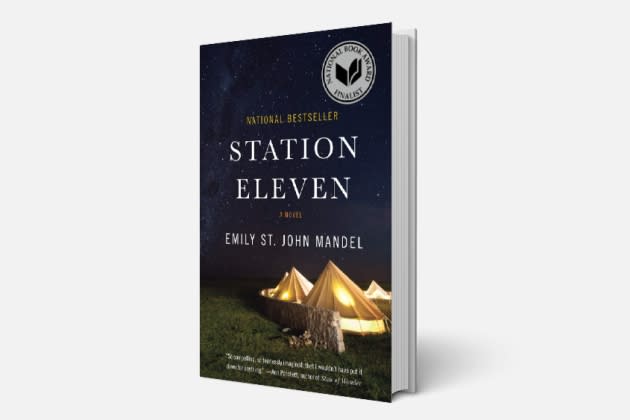‘Station Eleven’ Boss on Not Letting the COVID-19 Pandemic Take the ‘Joy’ Out of His Adaptation

HBO Max ordered an adaptation of “Station Eleven” in June 2019, months before the COVID-19 pandemic began to sweep the globe. But the series will soon launch in a world in which the pandemic is still ongoing, and it will tell a dual story about the early days of a virus that wipes out much of humanity and about what the world looks like years later.
Since the show has its roots in Emily St. John Mandel’s 2014 novel, showrunner Patrick Somerville shared during a Television Critics Assn. press tour panel for the show on Wednesday that changes were not made out of concern the material may hit too close to home by the time it is finally released.
More from Variety
HBO Max Announces 'The Sex Lives of College Girls' Premiere Date, Releases Teaser
'The Beatles and India' Sold to HBO Max, BritBox North America, Channel 4 - Global Bulletin
HBO Max Unveils 'Peacemaker,' 'Euphoria' First Look Footage During Emmys
“We had already started and we believed in the concept,” he explained. “We always wanted to make a post-apocalyptic show about joy. As we began to live it, we began to feel feelings we didn’t expect to know about, and they influence things, but I think we did what we were always going to do.”
When Somerville talked about already starting on the series before the pandemic began, he did not just mean the writers’ room. The first few episodes were shot ahead of March 2020, as well. During that month, he said, they had a hiatus scheduled, which happened to fall at the same time the rest of the industry went on pause due to the pandemic. Thankfully production got to resume, and in doing so, the feeling of capturing community coming back together and the need for art and entertainment that is depicted within the show felt even more important, according to the producing team, which also includes Jessica Rhoades and Jeremy Podeswa.
“The show is also about [that] what we had before is what’s after,” Somerville said. “Things are there on both ends of it, but what we learned is, I think, what matters.”
The story follows a young performer named Kirsten (Matilda Lawler) who is in a play with Arthur (Gael García Bernal) when he collapses on stage. Jeevan (Himesh Patel), an audience member, rushes to help, but it is too late for the man, who is caught up in the wave of illness that is only starting to take individuals of all ages, all across the world. Jeevan ends up helping Kirsten, and they form a quick bond. Twenty years later, though, as an adult, Kirsten (Mackenzie Davis) is a part of a traveling acting troupe in the new world, but she still clings to some pieces of her past.
“What really attracted me to Kirsten is that she’s this survivor-warrior archetype, but her weapons and her way of surviving is not exclusively through violence — although that comes up at some points in the show and definitely a lot in the book,” said Davis. “She has an instinct both in the sense of an animal instinct and as an actor instinct, and there’s this conversation between using your emotions to process events or as this proxy for trauma and surviving in the wilderness that are like holding hands in this show. And I think it’s a really beautiful argument for using emotions to thrive.”
Somerville noted that the show will deliver a “slow unfurling” as to how and why Jeevan and Kirsten lost each other after spending 80 days in an apartment together with his brother on the first day of the outbreak. He noted he felt there was room for more Jeevan in the show than the book delivered, and that is one example of some of the changes he made in the adaptation process.
Another was wanting to “make up a cult that we would want to join,” he said.
“We tilted more toward a pied piper-based, science man, rationalist cult leader who was just saying true things that everybody didn’t want to hear anymore because the survivors had been through quite a lot,” Somerville explained. “So, our cult is quite different, and the way it all comes together is quite different, but the spirit of that book to me was always about what’s gentle and human inside of us, before and after, and how do we get back to the people that we love, and how is that hard?”
“Fear can can forge new relationships and push people together and really bond humans together, and it also causes people to act defensively and radically and violently and with their own self interest,” Davis added. “The responses are as varied as there are human psyches — you’re going to have some reaction to stress and fear, and it’s not just going to be beautiful and nature isn’t just going to heal. There’s going to be real penalties and beautiful moments, but I think our show deals with all of those. … I’m glad that it’s neither a cautionary tale, nor idealizing trauma and mass loss.”
Best of Variety
Awards Season Calendar (2021-2022): Eligibility, Nomination and Voting Schedule
Celebrate 'Star Wars: Visions' With These Unique, Intergalactic Gifts
Sign up for Variety’s Newsletter. For the latest news, follow us on Facebook, Twitter, and Instagram.

 Yahoo Finance
Yahoo Finance 